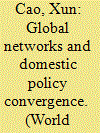| Srl | Item |
| 1 |
ID:
114495


|
|
|
|
|
| Publication |
2012.
|
| Summary/Abstract |
National economies are embedded in complex networks such as trade, capital flows, and intergovernmental organizations (igos). These globalization forces impose differential impacts on national economies depending on a country's network positions. This article addresses the policy convergence-divergence debate by focusing on how networks at the international level affect domestic fiscal, monetary, and regulatory policies. The author presents two hypotheses: first, similarity in network positions induces convergence in domestic economic policies as a result of peer competitive pressure. Second, proximity in network positions facilitates policy learning and emulation, which result in policy convergence. The empirical analysis applies a latent-space model for relational/dyadic data and indicates that position similarity in the network of exports induces convergence in fiscal and regulatory policies; position similarity in the network of transnational portfolio investments induces convergence in fiscal policies; and position proximity in igo networks is consistently associated with policy convergence in fiscal, monetary, and regulatory policies.
|
|
|
|
|
|
|
|
|
|
|
|
|
|
|
|
| 2 |
ID:
097723


|
|
|
|
|
| Publication |
2010.
|
| Summary/Abstract |
Cross-border cooperation among domestic regulators and public officials has become a defining feature of global governance. While a number of studies have tracked the emergence and institutionalization of such transgovernmental networks, less is known about their effect on domestic policy. This study explores this link for the important case of insider-trading regulation in original data for 116 countries between 1977 and 2006. It offers quantitative evidence that transgovernmental cooperation is related to domestic policy convergence but that the relationship is more complex than often assumed. Direct ties to powerful regulators increases a jurisdiction's likelihood of adopting internationally promoted policies such as insider-trading rules. Separately, membership in the International Organization of Securities Commissions (IOSCO), a forum designed to diffuse best practices among regulators, increases a jurisdiction's likelihood of subsequently enforcing newly adopted policies. The findings in this study suggest that different network components are associated with distinct aspects of domestic policy convergence. The results are directly relevant for current public policy debates about the reregulation of global financial markets as transgovernmental networks among domestic regulators have assumed a critical role.
|
|
|
|
|
|
|
|
|
|
|
|
|
|
|
|